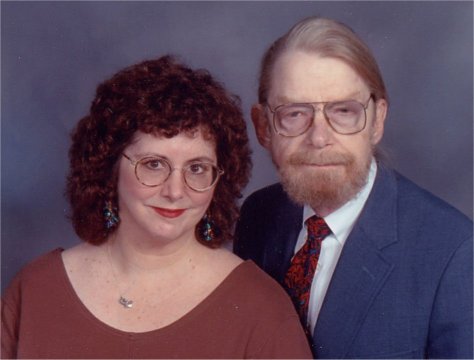Jerry O' My Heart
Jerry O' My Heart
by Mary W. Matthews
It all happened so fast. My husband went in for a routine physical.
The internist had an echocardiogram done and sent Jerry to a cardiologist. The
cardiologist did a simultaneous trans-esophageal echocardiogram and cardiac
catheterization and sent him to a surgeon. And suddenly there I was, sitting
in the surgical waiting room at All Children’s Hospital (and don’t think I’m
ever going to let my husband forget that his surgery was done at All Children’s).
(For reasons that were explained to me but that I don’t remember, two hospitals
that are side by side, like Bayfront and All Children’s, are not allowed to
both host heart surgeries. Bayfront patients like Jerry are taken to
All Children’s through a tunnel. Jerry spent the first night in Intensive Care
at All Children’s, and then was taken back to Bayfront for the rest of his hospital
stay. On being informed that I would be allowed to go through the tunnel with
Jerry, I said, “Oh, goody! And will there be a bright, white light at the
other end of the tunnel, and loving beings waiting there to welcome us to the
other side?” The nurse laughed and said, “Loving beings with knives
. . .”)
It is impossible to express adequately my gratitude to FM Marie Roberts, formerly
a good friend and now my adopted sister. Marie dragged herself out of bed in
the middle of the night and drove all the way from North Redington Beach, about
half an hour’s drive even an hour before dawn. At 6 a.m., Marie searched both
Bayfront and All Children’s, and found us just in time to wish Jerry good luck
before they wheeled his gurney away. Then she stayed with me until after Jerry
was in Intensive Care, keeping me distracted in the waiting room with elegant
conversation — wise, insightful, good-humored, and refreshingly commonsensical.
Truly this is a queen among women!
I have to wonder who has a tougher time in situations like this — Mensans
or “normals”? I have a vivid imagination. I also have a lifetime of
watching medical dramas on TV, young Dr. Kildare, Ben Casey, Marcus Welby,
Medical Center, St. Elsewhere, E.R., and many more. And then there’s one
of my college roommates, who today is, according to Washingtonian magazine,
one of the 100 best doctors in that metropolitan area. Laurel was constantly
coming down with whatever disease had been featured on Medical Center
that week — even diseases she couldn’t possibly get, like prostate cancer.
All this has made me one of the finest lay diagnosticians in the world.
I sat in that chilly waiting room and thought about all the ways the operation
could possibly go wrong. A nurse called me from the operating room every half
hour or so to give me progress reports: We’re prepping him now. Now he’s on
the heart-lung machine, but we haven’t decided yet what’s best to do. Now we’ve
decided that Jerry’s mitral valve does not need to be replaced, that it can
be repaired. Now we’re getting ready to close. It seemed to me that if something
horrible happened — like an alien bursting out of Jerry’s chest, skittering
across the floor with a squeal, and disappearing to wreak havoc that only Sigourney
Weaver would survive — I wouldn’t get a phone call; the surgeon himself
would come and take me to a private place and break the news in person. As long
as the surgeon did not appear in the doorway of the waiting room, everything
was all right.
Intelligence is such a small part of what we are as human beings that it would
be insane to claim that just because we perform better on standardized tests,
we also feel more profoundly or intensely. But an imagination that can range
from Sudden Adult Death Syndrome to a masked invader bursting in and stealing
Jerry’s heart with a shout of “Allahu akbar!” is surely to be pitied
in situations like these. I jest because I still have trouble contemplating
the possibilities that ran through my mind that morning.
In the event, the operation went smoothly, and I even got the impression the
surgeon had enjoyed himself, although of course it would never do to say so.
Jerry gains in strength and vitality daily, almost as visibly as a stop-motion
film of a seedling turning into a flower. Daily I am consumed with guilt that
I didn’t notice what had been happening to him over the last five years, that
I didn’t nag him harder about getting those annual checkups. (“&147;sn’t that
just like a woman?” my hairdresser commented. “To feel guilty because
you didn’t nag enough?”)
Jerry is older than I am, but these days he’s my precious boy. For some unfathomable
reason, God created Jerry to my exact specifications — kind, generous,
smarter than I am (though he claims otherwise), well and widely read, bored
by televised sports — and then inserted him into history retroactively,
as it were. (Jerry also claims I’ve gotten this backward too.) Each forward
step of Jerry’s recovery brings me the mixed emotions of a mother — the
first time he didn’t need my help to bathe, the first time we walked around
the block, the first time he asked for a weaker pain reliever than oxycodone.
My boy is returning to himself rapidly — and even better, it’s the self
he was when we were first married, in 1989. The sap is rising, and I rejoice
to see it.

Mary and Jerry in December 2002
|